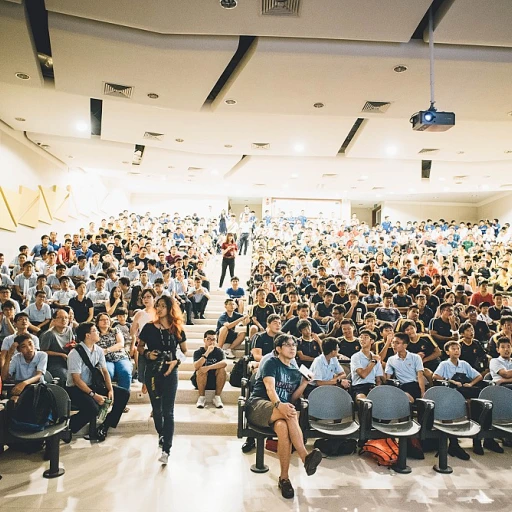
Understanding the Importance of Mentoring Interns
Importance of Intern Mentorship in Professional Growth
Internship programs are foundational to a student's early career, bridging the gap between academic theory and practical experience. Mentoring internships can significantly influence career development by providing invaluable insights into the workplace. Not only does it prepare interns for their future roles, but it also enhances their professional development through real-world interactions.
By investing time and resources into mentoring interns, organizations can cultivate a pool of skilled professionals ready to contribute to their growth. A successful mentoring relationship can shape an intern's career trajectory, offering guidance and support as they navigate their initial experiences in the workforce.
A mentor acts similar to a teacher, offering the necessary tools and feedback to help interns develop crucial skills. This partnership lays the groundwork for a productive and long-term career. It becomes evident that when organizations prioritize internship mentoring, they are not only benefiting the intern but also potentially boosting employee retention rates. By ensuring a proper mentoring program is in place, companies foster an environment of trust, learning, and mutual growth.
For further reading on how mentoring correlates with employee retention, explore this article on understanding the differences for better employee retention.
Building a Structured Mentorship Program
Crafting a Mentorship Structure That Delivers Results
To successfully mentor interns, an effective and structured mentorship framework is essential. Designing a practical system for your organization can significantly enhance the intern mentoring experience and lay the groundwork for lasting career development. Start by clearly defining the roles of both the mentor and the mentee. This clarity helps manage expectations and ensures each participant understands their responsibilities. The mentor should serve as a guide, teacher, and advisor to the intern, sharing insights from extensive professional experience. In addition to role definition, create a mentorship plan tailored to individual needs. This plan should include scheduled meetings that allow for regular feedback and open discussions. Allocate time for both formal and informal interactions, as these moments foster a genuine mentoring relationship. Official sessions can address skill development and specific objectives, while informal gatherings can encourage rapport building. Consider implementing a feedback system that is reciprocal. Constructive feedback from mentors helps interns better integrate into their roles, while interns' feedback can provide invaluable insights for enhancing the mentoring program. Encourage an environment of open communication that supports continuous learning. Provide tools and resources that aid professional development. This could be access to workshops, industry seminars, or reading material that aligns with the intern's career interests. The aim is to surround the intern with opportunities for growth, preparing them for future roles. Lastly, establish a privacy policy and user agreement for the mentorship program. This ensures that confidentiality is respected and creates a secure atmosphere, promoting transparency and protecting the interests of all parties involved. Structuring such a detailed framework offers a balanced approach to mentoring interns, nurturing them into valuable contributors to the professional world. Learn more about distinguishing coaching from formal disciplinary actions to bolster employee retention efforts.Creating a Supportive Environment
Fostering an Encouraging Atmosphere for Growth
Creating a supportive environment is crucial in ensuring interns feel valued during their internship. Such an environment paves the way for effective learning and personal development, enhancing their professional journey. Organizations that prioritize fostering a positive work culture often witness higher levels of motivation and productivity among interns, as well as a more successful mentor mentee relationship.
First, clear communication is paramount. By setting transparent expectations and goals, both mentors and interns can align their efforts effectively. This alignment helps in reducing any confusion, enabling interns to focus on acquiring the skills pertinent to their future careers.
Additionally, offering access to resources is vital. Providing interns with the tools they need, such as training materials, industry reports, and relevant software, ensures they have the means to succeed. Furthermore, networking opportunities, both within and outside the organization, can significantly enhance their internship experience. Encouraging interactions with professionals in their field can shape their career trajectory in a meaningful way.
Mentors should also highlight the value of feedback. Constructive feedback not only aids in skill development but also builds confidence in interns. It's essential to maintain a balance between guiding and allowing space for independence, enabling students to engage in problem-solving and decision-making processes. This approach imbues them with a sense of ownership and responsibility, crucial skills for their professional development.
Implementing an intern mentoring framework within the organization can enhance this supportive atmosphere. A structured mentorship program should ensure regular check-ins, where students can voice any concerns and mentors can provide individual guidance tailored to the intern’s needs. This program should also promote diversity and inclusion, offering equal opportunities for all interns, including female interns, to thrive.
Finally, creating a supportive culture is not just the responsibility of the mentor but an organization-wide commitment. By embracing a collaborative and inclusive ethos, organizations strengthen their internship programs, reinforce team dynamics, and prepare interns to step confidently into their future roles.
For an in-depth exploration of guiding interns towards long-term success, visit this comprehensive job description guide on our employee retention blog.
Developing Skills and Providing Feedback
Nurturing Talent Through Constructive Feedback
Providing interns with regular, constructive feedback is crucial for their professional development and the overall success of the mentoring relationship. As mentors, it's important to create a supportive space where interns feel comfortable receiving and discussing feedback. Constructive feedback not only guides interns in improving their skills but also helps them understand their strengths and areas for growth. A structured mentoring program ensures that such feedback is part of the regular interaction between mentor and mentee.- Be Specific and Timely: Address feedback at the appropriate time, focusing on specific incidents or projects. This ensures that interns can connect your observations with their experiences and understand the context better.
- Encourage Self-Assessment: Engage interns in self-assessment, leading them to reflect on their progress and identify areas where they seek improvement. This promotes ownership of their development journey.
- Create a Dialogue: Feedback should never be one-sided. Encourage a two-way conversation where interns can ask questions and express their perspectives, fostering a more fruitful learning environment.
Measuring the Impact of Mentorship
Assessing the Value and Progress of Mentorship
In any internship program, understanding the impact of mentoring is essential. Evaluating the mentor-mentee relationship not only highlights the benefits experienced by both parties but also identifies areas for improvement. Here are some key aspects to consider:- Feedback Integration: Regular feedback sessions between mentors and interns can provide insights into the development of skills and areas needing attention. This interaction ensures that the student's professional development aligns with the organization’s goals.
- Career Progression: Observing the career trajectory of former interns who received mentoring can offer valuable metrics. Their advancement in the organization or other professional arenas showcases the effectiveness of the mentoring programs.
- Skill Enhancement: Collect data on how the internship experience has enhanced interns' capabilities. This includes tracking their ability to tackle specific work challenges and their overall contribution to the team and organization.
- Intern and Mentor Satisfaction: Surveys and interviews can provide qualitative feedback from both mentors and interns about their experience. Understanding their satisfaction levels can guide future modifications to the program.
- Long-term Contributions: Consider the future impact of mentorship on interns. Analyze whether these emerging professionals continue to support organizational objectives beyond their internship tenure, either by contributing ideas or becoming advocates for the program.
Overcoming Challenges in Mentoring Interns
Addressing and Overcoming Mentoring Hurdles
Mentoring interns is undoubtedly a rewarding experience, but it comes with its own set of challenges. Both mentors and mentees must navigate these obstacles to ensure a successful and effective internship program. Here are some common hurdles faced in mentoring relationships and ways to overcome them:- Time Constraints: Mentors often juggle multiple responsibilities, resulting in limited time for intern mentoring. To tackle this, organizations can develop a clear schedule that optimizes both mentors' and interns' time, allowing for quality learning moments without overburdening teachers.
- Lack of Experience: Interns often come with minimal work experience, making it essential for mentors to adopt patience and establish a gradual learning curve. Providing continuous feedback helps interns develop professional skills effectively.
- Unclear Expectations: Misalignment between mentors and mentees can lead to frustration. It's crucial to clearly outline expected outcomes and goals from the get-go, fostering a constructive mentoring relationship.
- Cultural or Gender Differences: Recognizing and respecting diversity, such as the challenges faced by female interns, enhances mutual understanding and supports an inclusive internship environment.
- Adjustment to New Work Environment: Interns may struggle to adapt to the organization’s culture. Mentors can facilitate this transition by sharing insights about professional development and encouraging open communication.












